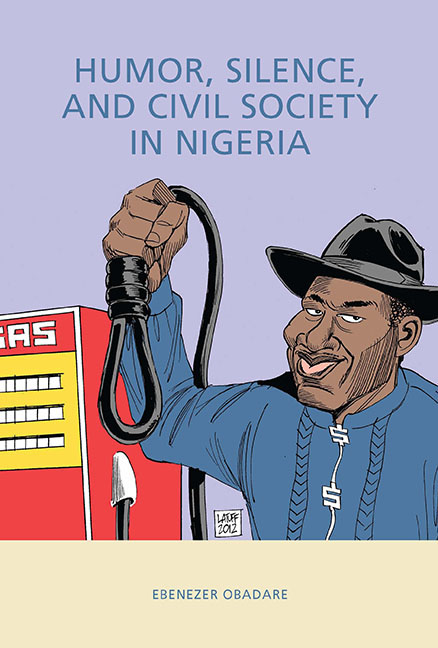3 - The Uses of Levity
Published online by Cambridge University Press: 15 February 2018
Summary
The monuments of wit survive the monuments of power.
—Francis BaconThe greatest levity is found in moments of the most profound gravity…. When life's darkest moments cast a shadow over all that had seemed important, the faithful response is to burst into uncontrollable laughter.
—Mark C. Taylor, Field Notes from Elsewhere:Reflections on Dying and LivingIntroduction
As I mentioned at the beginning of the book, my original introduction to the idea of civil society happened while I was a cub reporter for a national newsmagazine in Lagos, Nigeria, in the early 1990s. Incidentally, my earliest introduction to the subtleties of sociopolitical resistance and state-society relations in Africa also took place in the same milieu.TEMPO, the journal I worked for, had come into fraught existence following the proscription of theNewsby General Babangida in June 1993. An offspring of editorial defiance that has since gone down in the annals of media activism in the country and attracted modest scholarly attention (Olukotun 2002a, 2010; Adebanwi 2008),TEMPO, forced to operate in the shadows, relied solely on mobile logistics and the creativity of its reporters.
But that was hardly the only reason whyTEMPOsurvived the attentions of the military junta. Its resilience was buoyed by the support it received from state actors who sympathized with the publication's aims and operated as the “eyes” of the opposition within the state. Such “third eyes” ranged from top-ranking military officials to high-ranking police officers, “ordinary” policemen and women, and sundry security agents. They alerted us—journalists—to possible sources of danger, looked the other way when we passed them in the streets, and leaked crucial information to us. These third eyes actively subverted the state while, for all intents and purposes, simultaneously executing its diktats.
However, subversion from within was hardly a one-way affair. On the other side of this economy were “civil society” actors—newspaper reporters, editors, members of the labor union—who worked for the state by turning over priceless information, disclosing the whereabouts of key editorial figures, compiling the names and residential addresses of activist reporters, and assisting in the production of fake copies of critical newspapers. In short, these actors actually undermined civil society while appearing to advance its cause.
- Type
- Chapter
- Information
- Humor, Silence, and Civil Society in Nigeria , pp. 59 - 80Publisher: Boydell & BrewerPrint publication year: 2016



